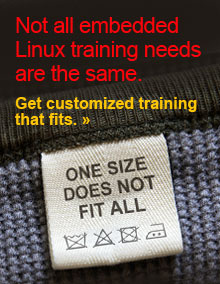|
Questions to Ask When Selecting a Printer to Connect to Your Embedded Linux Based Device Recently, one team of developers reached out to Timesys because they needed help getting their existing printer solution to work with their newest hand-held device. Their existing device was RTOS-based, however they chose embedded Linux as the platform for their new product. Since the team was new to Linux, they had a lot of questions, and they needed help adding their legacy printer driver to the build. Whether new to Linux or an experienced developer, ensuring that a printer will work with your custom embedded Linux application can be challenging. Does your new device need to support your legacy printer or do you need help choosing new printer support? Read on for recommendations from our engineering team on key questions you should ask up front that can help minimize headaches and ease the development process. 1. To what extent is the specific printer you wish to use supported in Linux? Whether or not you have a specific printer in mind, you should start by verifying support for a printer in Linux. To get an idea of general usability of a printer with Linux, including multifunction printers, you can refer to the OpenPrinting workgroup web site at www.openprinting.org/printers. There you can search by printer manufacturer and/or model, and you can find information about whether or not a driver is available for a specific printer. 2. How will the printer connect to the device? In general, USB / WiFi printers are more Linux friendly. Linux handles these interface standards very well and should handle any USB or WiFi printer that does not implement its own propriety protocol. 3. Are the binaries available for your chosen hardware architecture or sources provided by printer manufacturer? Knowing if proprietary binaries or sources for your hardware architecture are available is important. Very little can be done to support your ARM, MIPS, Power (or other) hardware architecture if the printer manufacturer only provides the typical X86 binaries. Also, many vendors are now at least providing ARM binaries in addition to X86. These are often geared towards Android, however, and may not work with Linux without some effort first. While these answers provide some guidance for selecting a compatible printer solution for your next embedded-Linux based application, we know each development project has its own unique challenges. When those challenges arise, we can help. We offer commercial support, enabling you to get help with troubleshooting development issues — at any stage in your development. If your development team is looking to expedite your custom product development, engage with Timesys Professional Services, and leverage our years of experience. Our extensive services menu ranges from project design review and building your custom Linux platform, to integrating your application and remote upgrades.
Timesys Joins The Qt Partner Program; Expands Support for Qt Timesys recently joined The Qt Partner Program as a Technology Partner. As a new member of The Qt Company’s Partner Program, we can help developers globally accelerate the design, development and delivery of Qt based products. Having supported open source Qt development for years, Timesys has expanded its offering to provide trial versions of Qt commercial in its award-winning LinuxLink product line. Whether choosing Timesys Factory or the Yocto Project build system, LinuxLink enables developers quickly and easily configure customized Qt-based applications and leverage Qt’s pre-configured software stack which allows immediate deployment of software on a variety of embedded hardware. To complement the expanded software offering, Timesys has bolstered its support, services and training to assist developers in designing, implementing and maintaining Qt based applications and connected devices. Timesys’ support contracts enable developers to get help with Qt based development when they need it. Timesys also offers consultation and services that address the design and review, modifications and optimizations of Qt based applications for embedded Linux based designs, enabling developers to leverage underlying hardware capabilities such as graphics acceleration. And for development teams wanting to stay abreast of best practices and new developments, Timesys provides customized training.
|
Additions and Updates in the Factory Recent Factory additions include: Version: 4.0.1-1 Version: 1.4.0-1 Version: 2.0-1 Version: 2.7-1 Version: 0.6.8-1 Recent Factory updates include: Version: 2.4.16-1 Version: 2.0-1 Version: 3.5.2-1 Version: 1.5.3-1 Version: 2.6.4-3 View all available packages in the Timesys Repository » 
Training & Events UPCOMING EVENTS FEB 23-25 • Nürnberg, Germany Embedded World 2016 We’ll be attending Embedded World 2016. Details about our demos and where you can find us at the event are to come on our web site and in our next LinuxLink Alert newsletter! PAST EVENTS OCT 1 • Paris, France Designing with Freescale Solutions Seminar During this year’s event, Timesys delivered a hands-on workshop titled, “Building a Linux Based IoT System.” If you were unable to attend this seminar and would like a copy of our presentation, please email us at info@timesys.com. OCT 12-15 • Orange County, CA Renesas DevCon 2015 Timesys delivered both a lecture titled “How to Leverage XIP Technology for Your Embedded Linux Based Device” and a hands-on workshop titled, “Embedded Linux Application Development.” If you were unable to attend this event and would like to request a copy of the content from the Timesys sessions, please send an email to info@timesys.com. |
  
|
©2015 Timesys Corporation. 428 Forbes Avenue - Suite 2100, Pittsburgh, PA 15219 To subscribe to the LinuxLink Alert newsletter, click here. Timesys and the Timesys logo are registered trademarks of Timesys Corporation. ARM is a trademark of ARM Limited. Freescale is a trademark of Freescale Semiconductor, Inc. Linux is a registered trademark of Linus Torvalds in the United States and other countries. Qt is a trademark of Digia Corporation in Finland and/or other countries worldwide. Yocto Project is a registered trademark of The Linux Foundation. All other company and product names mentioned are trademarks and/or registered trademarks of their respective owners. |


